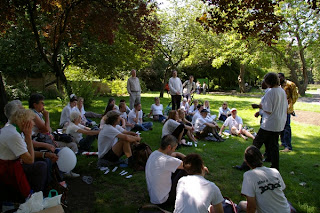 It was a long way to go for a demonstration. It gave me a lot of time to think about why I was going so far. The last three G8 demonstrations (in Europe), Genoa, Geneva and then Edinburgh, had been fantastic events to attend, huge crowds and a real sense of solidarity. Even some political impact!
It was a long way to go for a demonstration. It gave me a lot of time to think about why I was going so far. The last three G8 demonstrations (in Europe), Genoa, Geneva and then Edinburgh, had been fantastic events to attend, huge crowds and a real sense of solidarity. Even some political impact! It seemed to me that the impact, both personally and politically, depended on the scale of demonstration of civil society’s demand for change. We had been keen for Europe to support Edinburgh, so now it was our turn.
It seemed to me that the impact, both personally and politically, depended on the scale of demonstration of civil society’s demand for change. We had been keen for Europe to support Edinburgh, so now it was our turn.Rostock is a charming small town and port, maybe the size of Chester (sorry, I don’t know any small towns in the South East!). There was a real festival atmosphere as people gathered for the march at the main station. The debt campaign in Germany is led by Erlassjahr and their theme this year was ‘strike out illegitimate debt’ and big red balloons. Initially I was a trifle disappointed as there were perhaps only 20-30 people with big balloons around. It turned out that Erlassjahr had arranged to meet at the Marienkirche (church) for a service and to join the march as it passed. Off I went to the church and seeing it full of huge balloons restored my spirits. But I went back to the start of the march (actually there were two marches, one from the station, the other from the camps).

Once it got going (why are they always late?), it was a really lively, inspiring march, with great samba bands, clowns and masses of colourful figures. I’ll focus on two, with pictures: the main Erlassjahr banner and Jubilee South banners and then a great idea under the name, ‘G8 Kings of the Road, never mind the Poor’. As you can see from the picture, they had these devastating statues of gaunt poor and had the 8 presidents in red regal costumes above them. (Apparently the statues as well a another of the statue of liberty with the message Freedom to Pollute, are by a famous sculptor).
The march went through the town (really quiet deserted streets except for the police!) and reached a wide open space at the docks, where we spent the rest of the day with speeches, music and what the Germans always seem to do well stalls selling beer, wine, sekt, bratwurst, noodles etc etc. But all told I would be surprised if there were more than 20-30,000 demonstrators, it just wasn’t that big an area and it wasn’t packed.
The dominant image was certainly the balloons. Maybe only 1 in 4 or fewer people were flying the balloons but nothing else had the impact. For the rest, it was a case of a hundred messages lost in the noise ranging from climate change to women’s rights and asylum issues.
But it got colder and colder and even wrapped up in a fleece and gloves I needed to get by the bratwurst braziers to keep warm. Later in the evening people lit small fires of the placards to keep warm as they partied into the evening.
The Alternative Summit crammed some 120, 2-hour workshops into one and a half days, so each session you had to chose between maybe 20 - 30 topics. I went to two on illegitimate debt. I have to say they gave me more cause for concern than enthusiasm. The cases considered bordered on the obscure to complex. The driving agenda, especially from Southern Voices, amounted to a strategy to establish that all debt is illegitimate; in effect it is a capitalist tool of oppression.

For me the summit ended with a great party at the closing concert. It was huge certainly; they claimed 70,000. The weather was fantastic and it was a real party atmosphere. The bands weren’t the big names as at Live8, but it didn’t matter. Bob and Bono appeared briefly but musically their contribution was ‘limited’. Herbert Grönemeyer was the real star performance in fact. But as ever, the real atmosphere was the massed crowds all enthused (however briefly) singing against poverty.
So, why have I said nothing about the violence? Well partly because I avoided most of it, partly because it distracts from the message we want to send. It’s true the police were up for it. As I drove the last legs to Rostock I passed convoys of police vans, water cannon trucks, even armoured vehicles. And there were enough young (that’s presumptive opinion!) men only too happy to have a go. But equally it made me smile to see the police ‘Anti-Conflict’ teams out keeping minor issues under control and the clowns teasing and mocking the police, whilst they were amusing, must have been very irritating.
Overall, I doubt Rostock had any significant political/poverty impact. There were too few people; it was too fragmented, too many disparate messages. The violence made for more sensational TV. Future demonstrations need the cohesion, the consistency and the mass support that the MAKEPOVERTYHISTORY campaign created.
And if Germany can organise recycling and public transport so well, why can’t we?!

Dave Pearce















